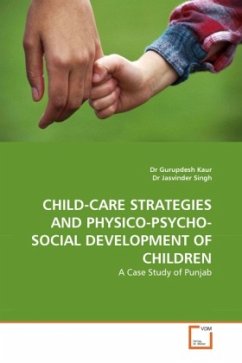
CHILD-CARE STRATEGIES AND PHYSICO-PSYCHO-SOCIAL DEVELOPMENT OF CHILDREN
A Case Study of Punjab
Versandkostenfrei!
Versandfertig in 6-10 Tagen
32,99 €
inkl. MwSt.

PAYBACK Punkte
16 °P sammeln!
India is predominantly agriculture based country and large number of females work in agriculture sector as labourers. These women labourers work for the survival of the family. Their busy schedule, long duration of work and extreme poverty hold them back in spending adequate time and mind for their children. Present book is an attempt to study the effect of maternal deprivation due to work on the development of children. An effort was made to determine whether or not maternal absence due to employment and consequent substitute supervision arrangement of mother is significant in the lives of ch...
India is predominantly agriculture based country and large number of females work in agriculture sector as labourers. These women labourers work for the survival of the family. Their busy schedule, long duration of work and extreme poverty hold them back in spending adequate time and mind for their children. Present book is an attempt to study the effect of maternal deprivation due to work on the development of children. An effort was made to determine whether or not maternal absence due to employment and consequent substitute supervision arrangement of mother is significant in the lives of children. Significance is measured in terms of broad developmental variables leading to child's achievement, intelligence, personal and social adjustment. This book will meet the requirements of, and will be found useful by, every one, who has a role to play in this field, including the Developmental Scientists, Teachers, Policy makers, Social workers, Government Officials, Government Departments and General Public at large.












